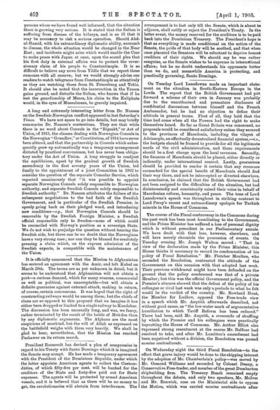The course of the Fiscal controversy in the Commons during
the past week has been most humiliating to the Government, and the Prime Minister has suffered a loss of personal dignity which is without precedent in our Parliamentary annals. We have dealt with that loss, however, elsewhere, and will here merely chronicle the procession of events. On Tuesday evening Mr. Joseph Walton moved : "That in view of the declaration made by the Prime Minister, this House thinks it necessary to record its condemnation of his policy of Fiscal Retaliation." Mr. Fletcher Moulton, who seconded the Resolution, contrasted the attitude of the Government on this occasion with that adopted last week. Their previous withdrawal might have been defended on the ground that the policy condemned was that of a private Member; but this was the official Government policy, and the Premier's absence showed that the defeat of the policy of his colleague or rival last week was only a prelude to what he felt would be the verdict of the country. Mr. Rowland Hunt, the Member for Ludlow, opposed the Free-trade view in a speech which Mr. Asquith afterwards described, not without good cause, as "the low-water mark of argumentative humiliation to which Tariff Reform has been reduced." There had been, said Mr. Asquith, a crescendo of shuffling by which the Premier and his colleagues were practically boycotting the House of Commons. Mr. Arthur Elliot also expressed strong resentment at the course Mr. Balfour had resolved to take, and after Mr. Lambton's amendment had been negatived without a division, the Resolution was passea rtemine contradieente.






































 Previous page
Previous page